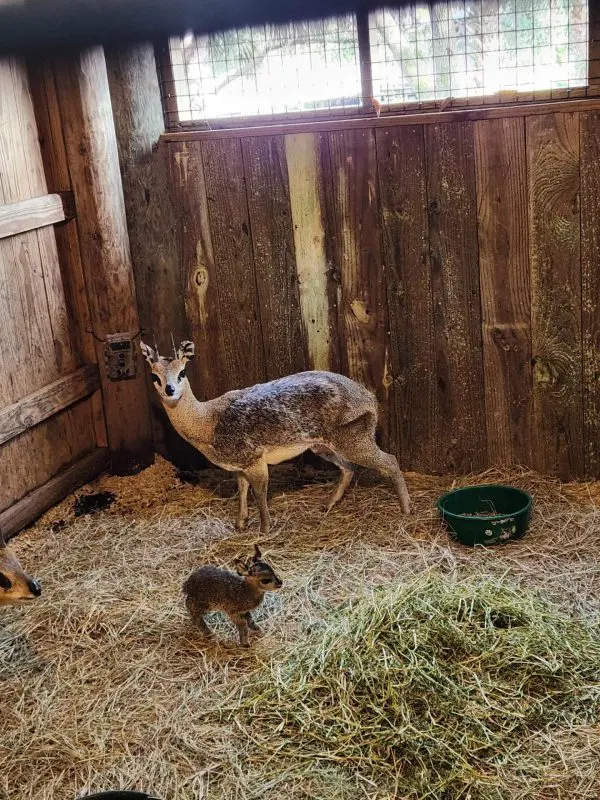

Both Deborah and the baby have been doing well since they were reunited.
We have some en-deer-ing news! Deborah and Ajabu, our klipspringer pair, have welcomed their seventh offspring at our Zoo! The young male klipspringer is now doing well, but this baby’s first few days started off on unsure footing.
The young klipspringer was born on habitat in Expedition Africa, but the animal care team quickly noticed something was wrong – he still hadn’t stood up after the normal amount of time it should take. If he did try to stand, he’d quickly fall to his side.
Our animal and veterinary care teams learned that the baby’s back leg had an injury. At first, we believed it might have been fractured. After further examination, our veterinary team thinks it was soft tissue injury, which possibly occurred during the birth.
Worried the young klipspringer wouldn’t be able to stand and nurse, the animal care team had to act fast.
“Without being able to stand his chances of nursing [were] zero,” said Lauren Hinson, director of animal programs.
Lauren took him home with her for two days to bottle feed him his colostrum every 2-3 hours. However, knowing that it would be best for the little guy to be with his parents as much as possible, baby was reintroduced to his parents after the two full days of critical supplemental care. They accepted him back right away, and Deborah displayed appropriate maternal care, such as grooming.
“A few supplemental feedings were provided at first, but very quickly baby began to seek out Deborah for nursing opportunities, which she allowed,” noted Alyssa Simon, area supervisor of the Africa platform.
There was some trepidation regarding how successful this reunion would be. However, attentive keepers have noted the baby’s successful weight gain after returning to nursing with Deborah. The animal care team will continue to monitor the new family, but everything has been going smoothly so far.
“Our biggest concern was the baby being able to remain standing and be able to nurse. Deborah is very patient with the baby, and he has proven to be quite the trooper,” said Alyssa.
Since the baby does still have some continued trouble walking, keepers would like to see his mobility improve before he makes short trips out onto the habitat. Until then, baby will spend his day sleeping in hay piles in their barn.
“This is typical behavior for klipspringer, as babies are usually hidden in foliage or rock crevices during the day to keep them safe from predators,” said Alyssa.
Despite being sleepy for most of the day, little klippy still has plenty of zoomies and quality time with mom and dad. We will keep you in the loop on social media to make sure you get the chance to spot the new baby as soon as possible!
Brevard Zoo is an independent, not-for-profit organization that receives no recurring government funding for our operating costs. Your generous support enables us to continue to serve our community and continue our vital animal wellness, education and conservation programs.
